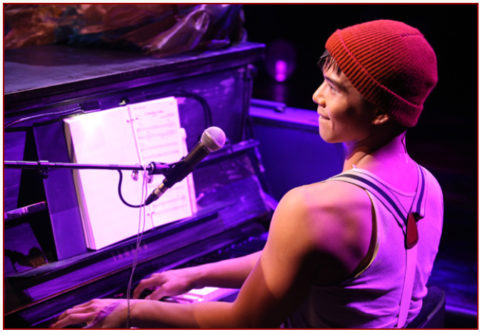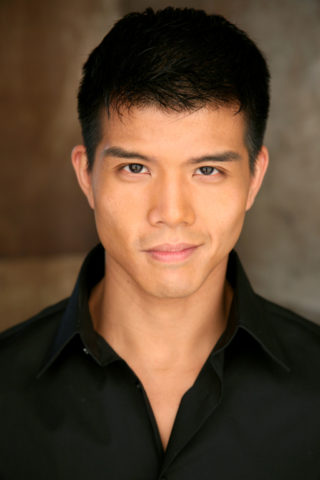
Just last week,Telly Leung ended a two-year stint in the demanding title role of Aladdinon Broadway. And for most of the two years prior to embodying the boy with the lamp-locked life coach, 39-year-old Leung—a Bay Area cabaret favorite who will perform in the “Live at the Orinda” series at the 144-seat Orinda theater (a two block walk from BART)—was also on Broadway stages; first as the George Takei-inspired lead in Allegiance and then in the ensemble of In Transit, the acapella musical by Frozen co-composer Kristin Anderson-Lopez.
That’s almost four non-stop years of singing eight shows a week, which can be tough on the vocal cords. In fact, that “almost” attests to just how tough: Near the start of the 2016 run of In Transit, Leung suffered a vocal injury which led him to miss about six weeks of performances, had him concerned about possible permanent damage and ultimately led to the new solo set he’ll be performing in the East Bay.
In the wake of last month’s sold-out Lena Hall shows at Feinstein’s at the Nikko—in which the “Hedwig” star chronicled her history of auditions—Leung’s Sing Happywill offer local theater aficionados a very different behind-the-scenes peek at the sometimes precarious career of a theater singer: Coping with a significant physical setback.
 “You know how athletes tend not to discuss the details of their injuries?” asks Leung—also recognizable to many from his role as Wes, one of the Warblers, on Glee—during a recent phone interview with the Bay Area Reporter. “Well, this happens with singers too. And Broadway singers really are vocal athletes—opera singers aren’t asked to sing eight times a week. But when you have an injury—especially if you’ve never had one before—there’s a fear that maybe you’ll be considered ‘damaged goods’.”
“You know how athletes tend not to discuss the details of their injuries?” asks Leung—also recognizable to many from his role as Wes, one of the Warblers, on Glee—during a recent phone interview with the Bay Area Reporter. “Well, this happens with singers too. And Broadway singers really are vocal athletes—opera singers aren’t asked to sing eight times a week. But when you have an injury—especially if you’ve never had one before—there’s a fear that maybe you’ll be considered ‘damaged goods’.”
Among the discoveries Leung made after being sidelined was just how many of his peers had quietly struggled with similar injuries. “So many people reached out to me with advice and support, many of whom I didn’t realize had dealt with this kind of thing.” In turn, says Leung, after his own full recovery, “I’ve reached out to four other injured performers to tell them about my journey with it.”
During his leave of absence from In Transit, Leung says “I went pretty much M.I.A.” And while noting that “I learned so much more about my voice” and how to use it through weeks of rehabilitation with a vocal coach, Leung says the down time made him think about broader issues as well.
 “I was pretty much at the height of my career so far, and all of a sudden I had to sit down and shut up. The universe was saying ‘Take care of yourself.’ For years, I’d worked on the days of so many weddings and birthdays and weekends and dinners. So I ended up spending a lot of quiet time with my family and my husband” Leung publicly announced his marriage to his partner of 12 years, James Babcock on Inauguration Day, 2017, pointedly adding ‘#LoveTrumpsHate’ to his online post.”
“I was pretty much at the height of my career so far, and all of a sudden I had to sit down and shut up. The universe was saying ‘Take care of yourself.’ For years, I’d worked on the days of so many weddings and birthdays and weekends and dinners. So I ended up spending a lot of quiet time with my family and my husband” Leung publicly announced his marriage to his partner of 12 years, James Babcock on Inauguration Day, 2017, pointedly adding ‘#LoveTrumpsHate’ to his online post.”
That bit of activist punctuation is typical of Leung, who has been outspoken about racial prejudice in casting and a limited number of roles written specifically for Asian Americans.
While Leung found great satisfaction in being in Asian-centric shows including Allegianceand Flower Drum Song, he’s also played Bok in “Wicked” and “Angel” in Rent. “As an actor, my approach is to always go in thinking, ‘Why not me?’ I can’t control my age, my height, my skin color.”
Given his desire to see more roles written for and played by Asian-American actors, how did he feel about being cast as Aladdin, a role that might have been played by an Arab-American? “That’s a totally fair question,” he says. “Disney was always very clear when they were putting the show together that Agrabah wasn’t supposed to represent a real place but a fantasy, and that the show could draw on a variety of cultural traditions.”
“I replaced an Aladdin who was half-Caucasian, half-Filipino. My understudy was half-Puerto Rican, half-Mexican American. My replacement is a white Australian actor. The show is very melanin agnostic. And I’m very proud to have been the first Far East Asian Aladdin.”
